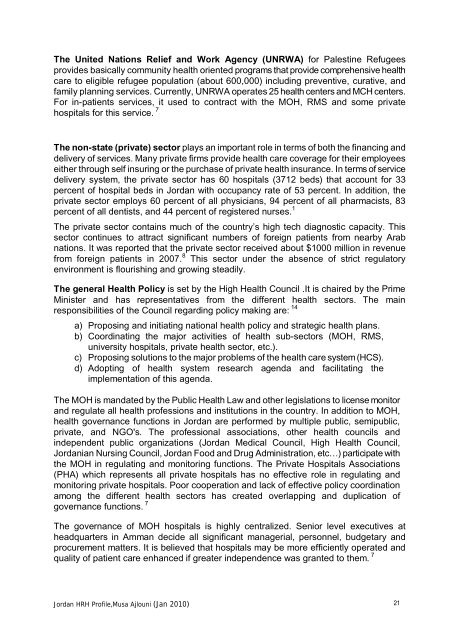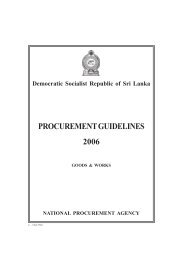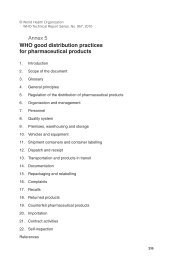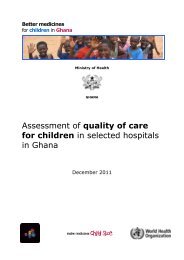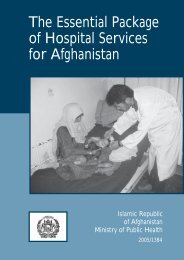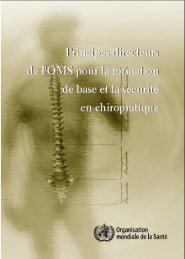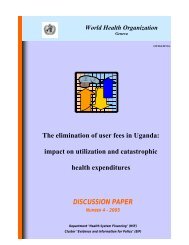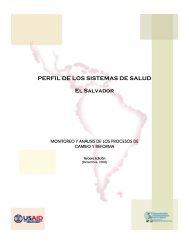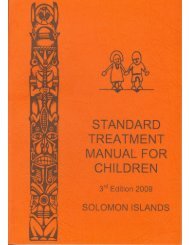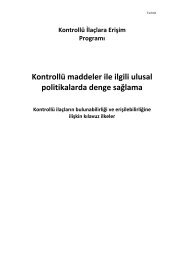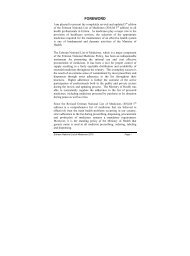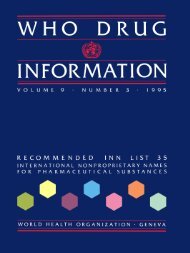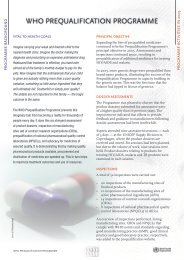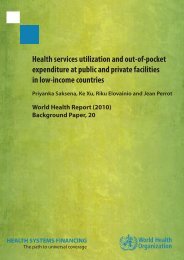Prepared by: Dr. Musa Ajlouni January, 2010 - World Health ...
Prepared by: Dr. Musa Ajlouni January, 2010 - World Health ...
Prepared by: Dr. Musa Ajlouni January, 2010 - World Health ...
You also want an ePaper? Increase the reach of your titles
YUMPU automatically turns print PDFs into web optimized ePapers that Google loves.
The United Nations Relief and Work Agency (UNRWA) for Palestine Refugeesprovides basically community health oriented programs that provide comprehensive healthcare to eligible refugee population (about 600,000) including preventive, curative, andfamily planning services. Currently, UNRWA operates 25 health centers and MCH centers.For in-patients services, it used to contract with the MOH, RMS and some privatehospitals for this service. 7The non-state (private) sector plays an important role in terms of both the financing anddelivery of services. Many private firms provide health care coverage for their employeeseither through self insuring or the purchase of private health insurance. In terms of servicedelivery system, the private sector has 60 hospitals (3712 beds) that account for 33percent of hospital beds in Jordan with occupancy rate of 53 percent. In addition, theprivate sector employs 60 percent of all physicians, 94 percent of all pharmacists, 83percent of all dentists, and 44 percent of registered nurses. 1The private sector contains much of the country’s high tech diagnostic capacity. Thissector continues to attract significant numbers of foreign patients from near<strong>by</strong> Arabnations. It was reported that the private sector received about $1000 million in revenuefrom foreign patients in 2007. 8 This sector under the absence of strict regulatoryenvironment is flourishing and growing steadily.The general <strong>Health</strong> Policy is set <strong>by</strong> the High <strong>Health</strong> Council .It is chaired <strong>by</strong> the PrimeMinister and has representatives from the different health sectors. The mainresponsibilities of the Council regarding policy making are: 14a) Proposing and initiating national health policy and strategic health plans.b) Coordinating the major activities of health sub-sectors (MOH, RMS,university hospitals, private health sector, etc.).c) Proposing solutions to the major problems of the health care system (HCS).d) Adopting of health system research agenda and facilitating theimplementation of this agenda.The MOH is mandated <strong>by</strong> the Public <strong>Health</strong> Law and other legislations to license monitorand regulate all health professions and institutions in the country. In addition to MOH,health governance functions in Jordan are performed <strong>by</strong> multiple public, semipublic,private, and NGO's. The professional associations, other health councils andindependent public organizations (Jordan Medical Council, High <strong>Health</strong> Council,Jordanian Nursing Council, Jordan Food and <strong>Dr</strong>ug Administration, etc…) participate withthe MOH in regulating and monitoring functions. The Private Hospitals Associations(PHA) which represents all private hospitals has no effective role in regulating andmonitoring private hospitals. Poor cooperation and lack of effective policy coordinationamong the different health sectors has created overlapping and duplication ofgovernance functions. 7The governance of MOH hospitals is highly centralized. Senior level executives atheadquarters in Amman decide all significant managerial, personnel, budgetary andprocurement matters. It is believed that hospitals may be more efficiently operated andquality of patient care enhanced if greater independence was granted to them. 7Jordan HRH Profile,<strong>Musa</strong> <strong>Ajlouni</strong> (Jan <strong>2010</strong>) 21


